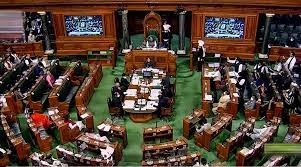
17th Lok Sabha: The highs and lows
The 17th Lok Sabha—June 2019 till February 2024—which wound up earlier this month will be remembered for several milestones.
The most prominent among them would be its shifting from the old circular Parliament building to the new iconic one on the Kartavya Path.
It will also be remembered for passing several key bills such as Women's Reservation Bill, 2023; the Jammu & Kashmir Reorganisation Bill 2019 repealing Article 370; the appointment of Chief Election Commissioner Bill, 2023; three bills replacing the Indian Penal Code 1860, Criminal Procedure Code 1973 and the Indian Evidence Act, 1872; three Farm Bill (later repealed); the Digital Data Protection Bill, 2023 and three Labour Codes etc.
Yet the 17th Lok Sabha saw a drastic decline in its status as a place for deliberation, discussion and criticism, the sheet anchor of a representative democracy.
Prime Minister Narendra Modi spoke on fewer occasions and showed a distinct preference for one-way messaging through instruments like his monthly ‘Mann ki Baat’ on the Akashvani, thereby avoiding opportunity for replying to questions or allowing scope for being countered.
This stands in stark contrast with two eminent predecessors. Atal Behari Vajpayee spoke 77 times during his six years as prime minister in the Parliament.
Manmohan Singh spoke on 44 times during 10 years he held the top executive post of the nation.
The 17th House would also go down into the annals of Parliamentary history for holding the fewest number of sittings i.e., merely 274.
Only four previous Houses had the fewer sittings, but those were owing to their being dissolved much before their term would end.
It was also the House which witnessed the largest number of MPs i.e., 146 being suspended from the House in the penultimate session and an MP (i.e., Mahua Moitra) being disqualified without being heard properly and much justification.
Although the Article 93 of the Constitution requires that Lok Sabha elect a Speaker and a Deputy Speaker, this was the first Lok Sabha which did not elect a Deputy Speaker all through its tenure.
The House also witnessed the most serious breach of security when two anti-social elements jumped into the House from the visitors’ gallery and burst canisters of harmful gases causing commotion and disturbance to the proceedings of the house.
Curiously, they obtained the visitors’ pass on recommendation from a member from the treasury benches.
The House also witnessed abusive comments being made by MPs with regard to other member-colleagues without the House taking up privileges motion.
The 17th Lok Sabha passed 179 bills but less than 20 per cent of them were referred to committees, a drastic decline from 14th and 15th Lok Sabha.
According to the Data compiled by PRS Legislative Research majority (over 90 per cent) of bills were passed without recorded voting. Statistics bear out that between 2019 and 2023, on average, about 80 per cent of the budget was voted on without discussion.
2023 takes the cake as the entire budget was passed without discussion. Even more glaring was passing of several key bill being passed as part of the Finance Bill despite the fact they barely fit that category.
One among them was the bill creating Electoral Bonds which was held unconstitutional by the Supreme Court last week. At least nine of the MPs did not speak a word during the tenure, and six of them belonged to the Bharatiya Janata Party which held a massive majority in the house.
Even a cursory look at the performance of the 17th Lok Sabha would suggest that the BJP government tends to bypass and circumvent the House and fights shy of discussion and deliberations which are essence of the democracy.
 English daily published in Bengaluru & Doha
English daily published in Bengaluru & Doha






